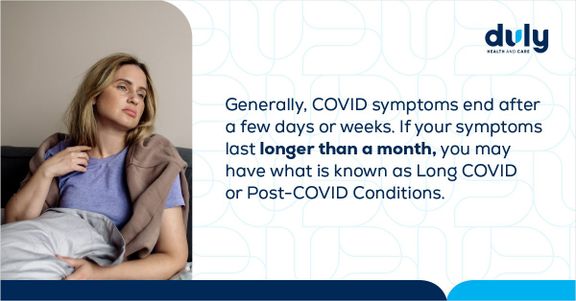More than 104 million cases of COVID-19 have been reported in the US since the pandemic began in 2020. It is estimated that anywhere between 7.7 and 23 million of those people now have Long COVID.
Long COVID occurs after your COVID-19 infection has ended. Also known as “Post COVID Conditions,” these symptoms can last days, weeks, months — or even years.

Generally, COVID symptoms end after a few days or weeks. If your symptoms last longer than a month, you may have what is known as Long COVID or Post-COVID Conditions.
If you have had COVID-19, you may be wondering about lingering symptoms that you may still be experiencing. How do you know if it’s Long COVID or something else? And if you do have Long COVID, what should you do next?
How Long COVID Impacts Your Body
No two cases of Long COVID are the same, and your symptoms may look or feel very different from someone else’s. Long COVID can show up in many forms — everything from a rash to dizziness to a change in your menstrual cycle may be a result of your previous illness.
Your symptoms might include changes that you feel in your:
Chest: Shortness of breath, fast heart rate, trouble breathing
Energy: Fatigue, tiredness, difficulty doing everyday tasks
Head/Neck: Cough, lack of smell, headaches
Digestion: Diarrhea, lack of taste, stomach pain
Because Long COVID can show up in a variety of symptoms, there isn’t any one way to diagnose it. Unlike a nasal swab test which can tell you if you have COVID-19, there isn’t a test that can tell if you have Long COVID.
Your Duly primary care provider can help you understand your symptoms based on your previous exposure or diagnosis of COVID-19, your medical history, and a physical examination.
Talk to your Duly Health and Care provider if you think you are having symptoms of Long COVID.
Mental Health Symptoms of Long COVID
In addition to the physical toll Long COVID can have on your body, keep in mind the ways it might affect your mental health as well.
Some side effects of Long COVID on your mental health can include:
Anxiety
Depression
Difficulty sleeping
Having a chronic illness that lasts for any length of time can be frustrating and have a significant impact on your mental health. If you are experiencing Long COVID symptoms, you may be frustrated if tasks that used to be easy are now more challenging. You may feel as though your friends and family just don’t get what you’re going through — or like they don’t respect your concerns about the ongoing pandemic.
You may feel especially frustrated if you “did everything right.” Even if you got fully vaccinated, avoided a COVID-19 infection for years, or just had a mild case, you can still be affected by lingering COVID symptoms.
These feelings can be tough to process — and tough to balance. Your emotional response is just as important as the physical symptoms you may be experiencing. Try not to ignore them or push them down.
Living With Long COVID
It might feel like there’s not enough information out there about what you or a loved one is going through, and you might find that you wonder about the unknown. While it may feel like the pandemic has lasted a lifetime, it is still a relatively new event — and what we know about COVID and Long COVID is still growing.
You may want to know what Long COVID really means for you — if it’s going to go away, or if there will be permanent damage. Having these kinds of concerns is okay, and medical experts are working tirelessly to find these answers.
Though we don’t yet know everything there is to know about Long COVID, there are some ways you can take care of yourself and manage your symptoms:
Talk to a therapist.
Consider talking to a therapist or joining a support group for people with Long COVID. It can be helpful to talk about your experiences with people who understand what you are going through.
If you are going to exercise, build up your ability gradually — over a period of time as long as 12 weeks. Some experts recommend cardio exercises you can do while sitting, like working on a rower or recumbent bike. Start with just 5 minutes of exercise 5 days a week and add 2 minutes to your exercise length each week.
Talk to your Duly healthcare provider.
If you have been experiencing symptoms for more than 4 weeks after your COVID-19 infection, talk to your Duly provider. Prepare some notes about your COVID-19 exposure, symptoms, and general medical history to help them make an accurate assessment of your condition.
Your Duly provider can help you understand and potentially treat some of your Long COVID symptoms. While living with Long COVID can be frustrating, you don’t have to go through it alone.
One of the best things you can do to protect yourself and your family from Long COVID is to prevent infection. Schedule your vaccine or booster today.
Health Topics:

